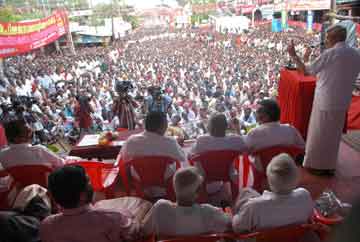 People's Democracy
People's Democracy
(Weekly
Organ of the Communist Party of India (Marxist)
No. 35
August 27, 2006
(Weekly
Organ of the Communist Party of India (Marxist)
|
Vol.
XXX
No. 35 August 27, 2006 |
P KRISHNA PILLAI BIRTH CENTENARY
Kerala’s `First Communist’

Prakash Karat
THE birth centenary of P Krishna Pillai on August 19, 2006 is an important landmark for the Communist movement in Kerala and the country. When communists observe the birth or death anniversaries of important leaders, they do so since the role and contribution of these leaders are an integral part of the development and history of the movement. In the case of sakhavu (comrade), we are observing the birth centenary of a leader who was one of the founders of the Party and a pioneer of the working class movement in Kerala.
The 100th anniversary is invested with a special poignancy. Here was a proletarian leader with enormous talents who was cut off in the prime of his life. His death from a snakebite, while being underground, at the age of 42, made his loss all the more unbearable and deeply affected the fledgling movement.
Comrade Krishna Pillai traversed the path of all pioneering communists in Kerala. Deeply influenced by the nationalist movement, he joined the jatha from Calicut to Payannur called at the time of the Salt Satyagraha of Gandhiji. He participated in the Guruvayur temple satyagraha, which exemplified the current of social reform in Kerala. He went on to join the Congress Socialist Party (CSP) when it was formed and became the first secretary of its unit in Kerala.
Krishna Pillai was the first to bring the proletarian current onto the centre stage of the political movement. It is as a leader of the CSP that Krishna Pillai blossomed into an organiser and working class leader as we remember him. Organising the textile, tile and coir workers, he led the early working class struggles in Kerala. The experience of the class struggle led him unerringly to communism. He was the first to see through the bourgeois character of the Congress leadership. In 1937 when the first unit of the CPI was formed, Krishna Pillai was one of the four members along with EMS, K Damodaran and N C Shekar.

Prakash Karat inaugurating Comrade Krishna Pillai centenary celebrations at Vaikam in Kottayam district on August 19, 2006
What made Krishna Pillai distinctive was his outstanding abilities as an organiser. This was displayed in his remarkable role in organising the working class and the early trade unions. EMS in his assessment of Krishna Pillai had stated that he had the capacity to unerringly size up a comrade and give him the work suitable to his talents.
From 1939 when the first communist conference was held, P Krishna Pillai became the moving figure in building the Party. It was his grasp of organisational work and drawing the best militants from the trade union and kisan movements which laid the foundations for the communist party emerging as a party of the masses. In the first conference of the CPI in Kerala held in Calicut in 1943, Krishna Pillai was elected the secretary of the state unit. In the Second Congress of the CPI in 1948, Krishna Pillai was elected to the central committee, just a few months before his tragic death.
If EMS became the theoretician and guide and AKG the man of the masses, Krishna Pillai was the organiser of the Party.
In some ways, the life and death of Krishna Pillai resembles that of Antonio Gramsci, one of the founders and outstanding leaders of the Italian Communist Party. Both died when they were in their forties. Gramsci died in a fascist prison. During his trial, the prosecutor had declared “we must stop this brain from working”. But Gramsci’s thought and work endured through the anti-fascist struggle and the Communist Party developed into a mass force in the later decades. Like Gramsci, Krishna Pillai died prematurely. But the seeds he planted flowered into a powerful communist movement in Kerala. Nine years after Krishna Pillai’s death, the Communist Party won the elections to the legislative assembly and formed the first communist ministry under EMS Namboodiripad in 1957.
The lessons to be drawn from Krishna Pillai’s life and work are many. Steadfast dedication to the working people; how to be a model communist organiser and above all passionate devotion to the cause.
The communist movement in Kerala was fortunate in having this luminous star as its helmsman. The Party in Kerala and the country will always derive inspiration and guidance from this “first communist”. The year-long birth centenary celebrations of P Krishna Pillai should be an occasion to gratefully acknowledge the heritage of this outstanding communist while pledging ourselves to carry forward his legacy.